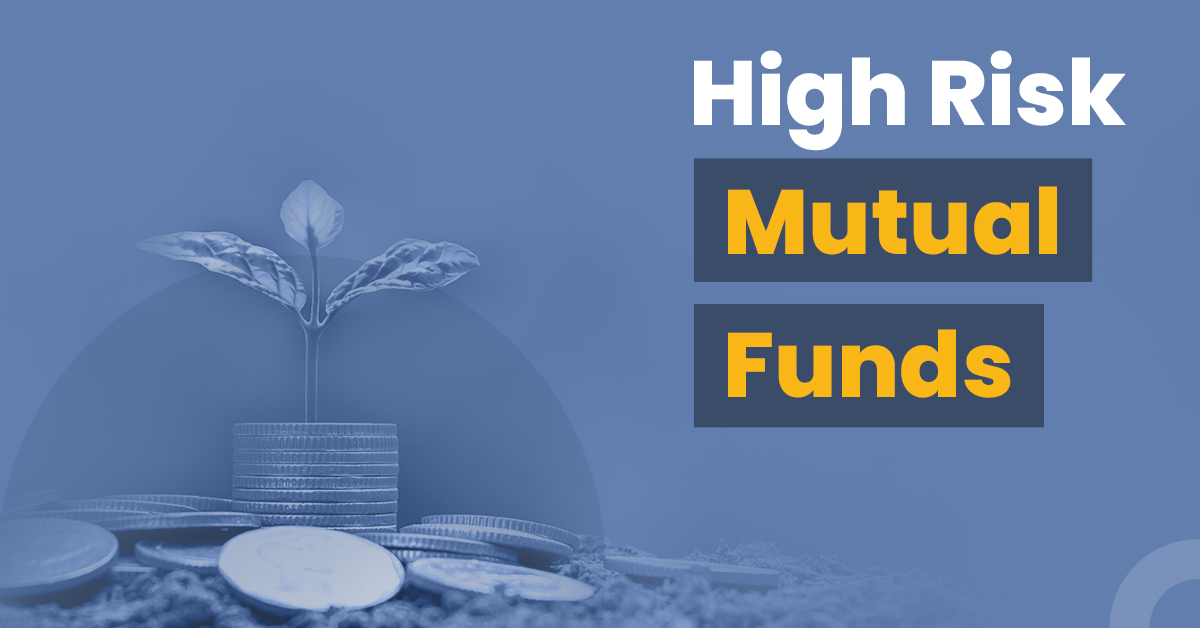Best High Risk Mutual Funds to Invest in 2023


People looking for a highly profitable investment can choose to invest in mutual funds with high returns and risks. One can classify mutual funds into high-risk and low-risk funds. Generally, beginners, senior citizens, and investors with low risk tolerance opt for low risk schemes. In contrast, aggressive investors prefer high risk mutual funds for their ability to generate market-beating returns.
The following sections will cover all essential details related to high-risk investment options.
What Are High-Risk Mutual Funds?
High-risk mutual fund schemes are usually equity investments that are volatile in nature. A few examples of high-risk funds are small-cap and mid-cap equity mutual funds. Please note that though these investment instruments are a risky proposition, they can generate significant returns.
Companies with small and medium capitalisation carry a considerable potential for future growth. However, their stock prices can decrease drastically in a bearish market or if they underperform. Some high-risk mutual funds invest in debt securities with higher yields but lower credit ratings.
Mutual funds that invest in large-cap companies are considered comparatively safer investments because they invest in stocks of established businesses. But, even these funds are exposed to the inherent risks of the equity market.
Asset Management Companies (AMCs) generally perform detailed research and evaluate the potentiality of attractive returns before they pick high-risk investments. It is important for investors to evaluate the past performance of the best high-risk mutual funds before investing.
Best High Risk Mutual Funds in India in 2022
The table below provides the details of the best-performing high-risk mutual fund schemes in India in 2022:
| High Risk Mutual Fund | 3-Year Annualised Returns | 5 Year Annualised Returns |
| Axis Small Cap Fund-Direct Plan-Growth | 29.56% | 19.69% |
| PGIM India Midcap Opportunities Fund-Direct Plan-Growth | 36.71% | 18.97% |
| Nippon India Small Cap-Direct Plan-Growth | 34.53% | 19.56% |
| SBI Small Cap Fund-Direct Plan-Growth | 31.07% | 17.94% |
| Kotak Small Cap Fund-Direct Plan-Growth | 35.30% | 17.51% |
| ICICI Prudential Small Cap Fund-Direct Plan-Growth | 31.00% | 15.42% |
| Kotak Emerging Equity Fund-Direct Plan-Growth | 27.31% | 15.37% |
| Edelweiss Mid Cap Fund-Direct Plan-Growth | 28.19% | 15.27% |
| Nippon India Growth Fund-Direct Plan-Growth | 27.35% | 14.98% |
| DSP Small Cap Fund-Direct Plan-Growth | 31.67% | 13.61% |
Features of High-Risk Mutual Funds
Listed below are features of high-risk mutual fund schemes:
- Asset allocation: Generally, these mutual fund schemes invest in stocks of companies that are in the ‘developing’ stage. Thus, the asset allocation of high-risk funds plays an essential role in determining their performance.
- Risk-reward ratio: Investing in high-risk securities generate significant profits or losses. However, the volatility of high-risk securities usually averages out in the long run, generating attractive returns.
- Type: High-risk mutual funds come in many types. Some of them are credit risk mutual funds, pure equity funds, hybrid funds, and balanced advantage funds.
- Investment mode: Investors can invest via two options—SIP (Systematic Investment Plan) or lump sum mode. The minimum amount for SIP investment may start from as low as Rs. 500, while the minimum amount for lump sum investment is Rs. 1000.
Benefits of High Risk Mutual Funds
Given below are the top benefits of these mutual fund schemes:
- Long-term capital appreciation
Financial experts consider these schemes as investment options for long-term capital appreciation. If an investor wants to keep their money invested for a long period then these schemes might be ideal options for them with considerably high returns.
- Higher returns
A significant benefit is that high-risk funds generate higher returns than most investment options. Equity mutual fund schemes primarily invest in stocks of growing companies. This improves their chances of generating returns. Additionally, debt mutual fund schemes invest mostly in low-rated bonds that have the potential to generate significant and inflation-adjusted returns.
- Chance to beat the benchmark
Financial experts have observed that when the market is experiencing a bullish phase, high-risk mutual funds have the potential to beat the underlying benchmark.
Who Should Invest in High-Risk Mutual Funds?
Given below are details of individuals who may prefer high-risk investments:
- People who have extensive knowledge about the market are ideal investors. Additionally, they need to have a good understanding of various macroeconomic trends.
- Moreover, investors with a high-risk appetite will want to invest in high-risk mutual funds for high potential returns.
- Investors who do not have a problem with exposing their portfolios to high volatility can choose these funds.
- Investors who wish to remain invested for a long time, i.e. young people with a long investment horizon, can opt to invest in high-risk mutual fund schemes.
Please note that these funds are not ideal for first-time investors. These mutual funds are also not the perfect option to fund short-term goals.
Important Things to Consider for High-Risk Investments
Listed below are essential factors that potential investors must take into account:
- Investment goal
Formulating a financial strategy based on a particular investment goal is crucial. People must recognise their long-term financial goals and set rational benchmarks before investing in high-risk mutual fund schemes.
- Taxation rules
As high-risk funds primarily invest in equities, they receive the same treatment as equity funds. The capital gains that investors earn are subject to capital gains tax. The tax rate depends on the holding period of the mutual fund units.
If the holding period is less than a year, the applicable tax rate for the short-term capital gains (STCGs) is 15% plus the applicable cess. However, if the holding period is a year or more, the tax rate for long-term capital gains (LTCGs) is 10% over gains of Rs. 1 lakh as LTCGs up to Rs 1 lakh are totally tax-free.
- Expense ratio
The expense ratio is the cost associated with managing a mutual fund. It varies from one AMC (Asset Management Company) to another. Investors must remember that the expense ratio and a fund’s returns share an inversely proportional relationship. So, checking a fund’s expense ratio before investing is essential.
- Fund’s past performance
Comparing the past performances of various high-risk mutual fund schemes helps one make a better investment decision. This is because if a mutual fund has performed well consistently in the past, it indicates that it is likely to achieve consistent returns. However, this is not always true. It is always crucial to compare the Fund’s fact sheet and some key performance ratios.
- Risk tolerance
The risk-taking ability differs from one investor to another. Therefore, assessing one’s risk tolerance is vital before investing in high-risk mutual funds. Evaluating the scale of losses that an investor can accept is an important thing to consider. In addition, risk tolerance helps in choosing the investment value.
Final Word
To sum up, high risk mutual funds may be volatile investment options, but they also have the potential to generate higher returns. Some crucial benefits include long-term capital appreciation and the possibility that the fund would perform better than the underlying benchmark.
FAQs about High Risk Mutual Funds
What will happen if I invest in high-risk mutual funds?
If an investor invests in high-risk mutual funds, he/she can benefit from the high-growth potential of the companies these funds invest in. People can receive higher dividends as well. In addition, one can use these funds to diversify their portfolio. But, please note that investors can incur losses in an unpredictable way.
Where do high-risk mutual funds usually invest?
High-risk mutual funds usually invest in mid-cap and small-cap companies. Additionally, the multi-cap fund is an important category under high-risk funds.
Can I lose money if I invest in high-risk mutual funds?
Considering the fact that equity mutual funds carry risks, there is always a possibility of investors losing their money. However, people may earn higher returns as well. Note that long investment tenure can mitigate the risk factor to an extent.




